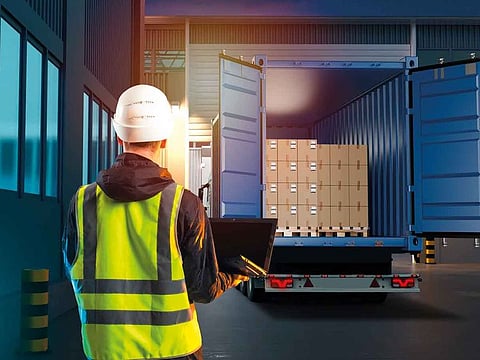Smart tech steers the UAE's maritime and logistics sector forward
Tech advancements help businesses streamline their operations and boost productivity

The shipping and logistics industry – vital to the world economy – is currently experiencing significant investments in technology and innovation aimed at elevating efficiency and service standards.
Despite facing various challenges — typical for any global trade hub — such as rising transport costs, global supply chain disruptions, and regulatory and compliance changes, the maritime and freight forwarding sector in the UAE has consistently stepped up by implementing strategies that build resilience and adaptability.
Despite facing various challenges — typical for any global trade hub — such as rising transport costs, global supply chain disruptions, and regulatory and compliance changes, the maritime and freight forwarding sector in the UAE has consistently stepped up by implementing strategies that build resilience and adaptability.
Over the years, the shipping and logistics industry has not only navigated these issues but also demonstrated a strong growth trajectory. According to Modor Intelligence, the nation’s freight and logistics market is projected to grow from $20.11 billion (Dh73.85 billion) in 2024 to $30.19 billion by 2030, at a rate of 7.01 percent.
This robust growth forecast underscores the sector’s willingness to invest in and embrace innovation, digitisation, and technological advancements, securing its competitive edge among other global trade hubs and ensuring ongoing expansion.
Key technologies such as AI, robotics, remote monitoring, SaaS solutions, blockchain and drones are driving transformative changes in the industry. By streamlining operations, enhancing inspections, and strengthening cybersecurity compliances, these advanced systems are reshaping traditional practices and paving the way for a more efficient future.

“Technologies like AI and IoT are revolutionising the logistics sector by making operations more efficient and accurate,” says Rasmus Clausen, Managing Director, Dubai & Iraq - Air & Sea, DSV Global Transport & Logistics.
“Predictive analytics help plan better routes and manage inventory, saving costs and improving delivery times. Real-time tracking devices provide enhanced visibility and security for shipments throughout the supply chain,” explains Clausen.
Meanwhile, big data analytics has emerged as a crucial force in the sector, helping companies predict potential problems and avoid costly maintenance issues. Ships and logistics companies generate vast amounts of data, including information about weather conditions, speed, vessel performance, fuel usage, and cyber threats. By analysing data, companies can identify patterns and trends and make informed decisions to enhance overall operations.
Simultaneously, the implementation of advanced digital technology across operations has spurred growth of on-demand services in the freight delivery and logistics sector. This expansion is driven by optimised route planning, real-time tracking, automated dispatching, and data analytics – all of which improve efficiency and lower operational costs.
Shahn’s app-based on-demand truck booking platform has markedly improved efficiency across the UAE’s supply chain. “By optimising supply chain management and reducing empty kilometres, Shahn contributes to a more efficient and sustainable transportation sector, which is projected to grow by 7.4 per cent between 2022 and 2026. This directly supports the UAE’s economic diversification goals,” says Rajesh Narayanan, Business Head at Shahn.

Shahn’s cutting-edge technology helps businesses in construction, manufacturing, and retail by tackling the challenges of fluctuating demand and fragmented supply chains with efficiency and precision.
“Our technology directly addresses these challenges by providing instant access to a network of trucks, ensuring these industries have the right resources at the right time. This results in significant reductions in wait times, allowing businesses to focus on their core operations and contribute to the UAE’s ambitious growth targets,” explains Narayanan.
Aligning with environmental goals
Shipping and freight forwarding companies are also adopting advanced technological solutions to expedite their net-zero transition and create more sustainable supply chains. By leveraging a range of innovations in route planning, cargo management, fuel savings, and emissions reductions, these companies are reducing their carbon footprint.
“Integrating technology is key to achieving sustainability in shipping and logistics. Smart systems optimise fuel use and route planning, while sensors monitor emissions and energy consumption. These advancements help reduce the carbon footprint and support eco-friendly practices in the industry. Moreover, blockchain technology ensures transparency and traceability in the supply chain, promoting sustainable sourcing and reducing waste,” explains Clausen.
In Dubai, DSV has introduced electric vehicles for airfreight and ocean container trucking, offering sustainable fuel options, and providing detailed CO2 emission data per shipment to help clients make informed decisions.
Prioritising sustainability has always been a strategic imperative for Tristar Group, a fully integrated energy logistics leader. The company is now at the forefront of industry transformation with its groundbreaking electro-hybrid coastal tanker, redefining the future of energy logistics.

“We conducted research on the available fuel-saving technologies and devices in the market. Unfortunately, none of these technologies, used independently or together, generated an acceptable emissions reduction,” says Tim Coffin, CEO of Tristar Eships, the Maritime Logistics Division of Tristar Group.
“Rather than focusing on various opportunities with negligible impact, we chose to direct our capital and efforts towards identifying and developing the technology with the greatest impact. After a multi-year project involving battery suppliers, shipbuilders, the Port of Fujairah, our Class Society, and – most importantly – our customers, we are now constructing an electro-hybrid coastal tanker that will achieve near-zero operational emissions, something no combination of existing energy-saving technologies can match,” explains Coffin. ■







